'My friends call me Lara Croft'
- Published
PC Kelly Ellis says her friends have dubbed her Lara Croft
PC Kelly Ellis has her finger hovering over the trigger of her Heckler and Koch G36 rifle.
She has a split second to decide whether to open fire on a man who appears to be drunk and suicidal and is holding a shotgun, pointing it at the ground.
Her colleague is calmly - but firmly - explaining the right thing to do is to put the weapon down.
But what if he does not? What if he raises the barrels? What then?
Welcome to the firearms training school.
Over three months, the BBC's Victoria Derbyshire programme had unique access to some of the new recruits being assessed in Cheshire.
These are the scenarios - the life and death decisions - that any British officer who wants to carry a gun must go through.
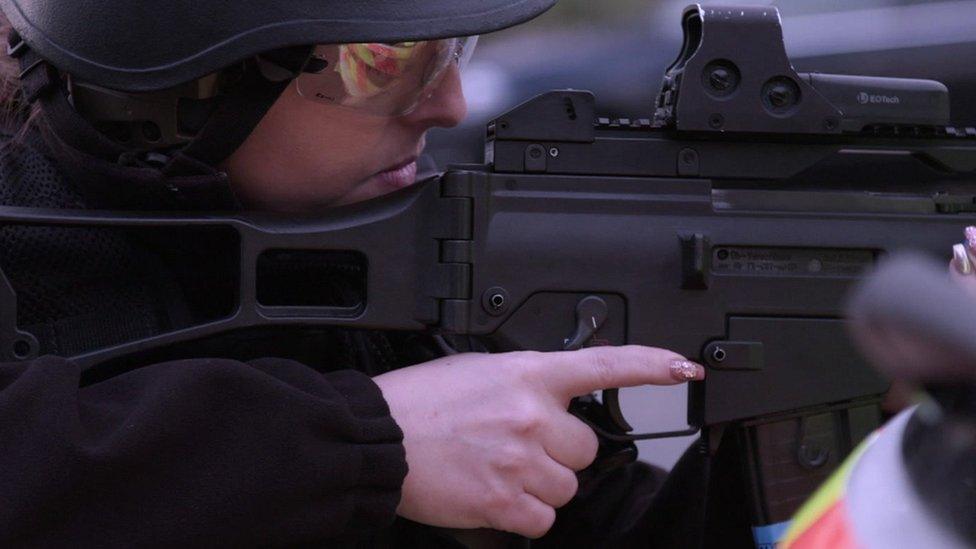
Aiming to qualify: PC Kelly Ellis
And if they make the wrong decision - pull the trigger when there was no need, or pull it when it is too late - then they are out. They will not make the grade.
By the end of next year, the UK will have about 7,500 armed police officers, after the government reversed a fall in their numbers since 2010.
Officers with years of firearms experience had been leaving their forces as police budgets were cut.
Now the numbers are rising again because security chiefs want more firearms teams available to counter any attempted Paris-style attack on the streets of Britain.
But given that the job requires volunteers - and those volunteers may one day be accountable for their actions before a jury - have the new recruits got what it takes?
While her friends have dubbed her "Lara Croft" - after the Tomb Raider action hero - PC Ellis says her parents were "apprehensive" when she first told them she wanted to train as a police firearms officer.
However, she says: "I tried to explain to them that the training we get, the weapons we are carrying, that actually I'm going to be more protected than I am now as a regular officer out on the streets."
She says the course is "easily the hardest thing I've ever had to do".
"It's just a lot to take in and a lot to remember. It's exhausting really."

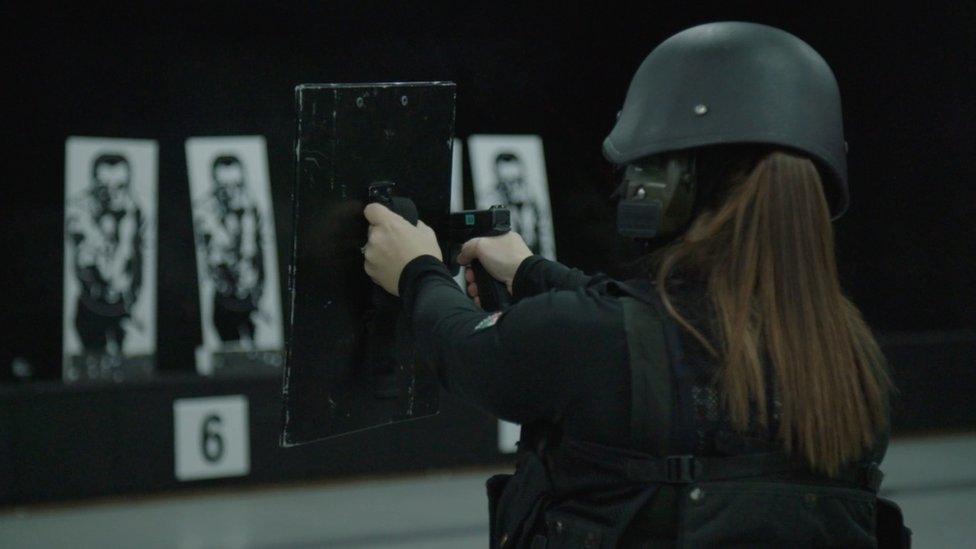
PC Kelly Ellis in training
Find out more
Watch Dominic Casciani's full film on firearms training on the Victoria Derbyshire website.

And she says the possibility of coming face to face with an armed situation is now becoming more of a reality.
"Sometimes I go home from here of an evening, and you see what's going on in the news and you just think, 'In a few months' time, if I pass this course, that could be me, going out to that job, first on the scene, having to discharge a weapon.'"
She adds: "It is about putting your life on the line, but that's what I want to do.
"I get a massive sense of achievement from doing it, as well."
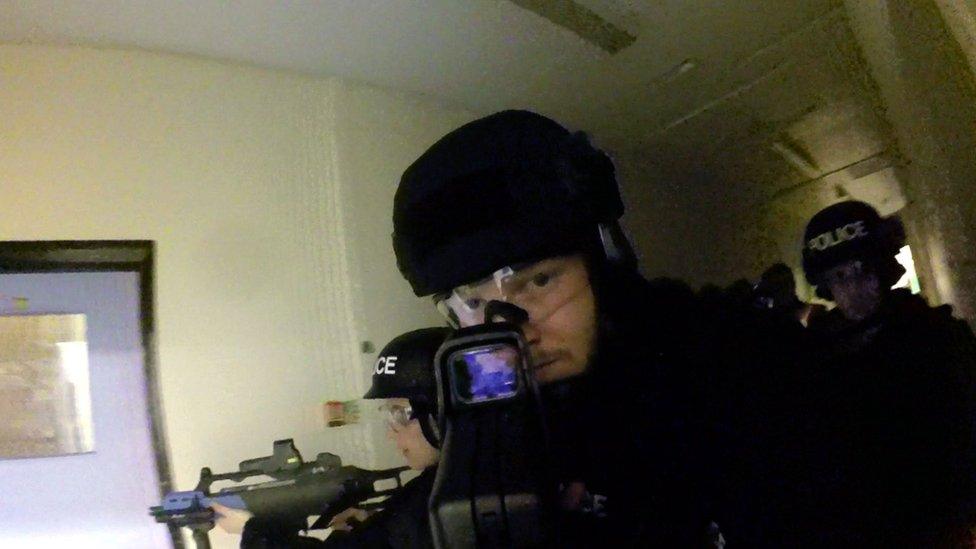
Safety: Officers are first taught how to handle a weapon...
The firearms centre in Cheshire trains officers from all over the country.
We watched 15 recruits being taught how to:
shoot
search and clear buildings of suspects
stop a vehicle carrying an armed suspect
save the lives of anyone critically injured in an incident.
And that includes saving the lives of people they have just shot: according to the programme, they are trained to incapacitate a threat - not to kill.
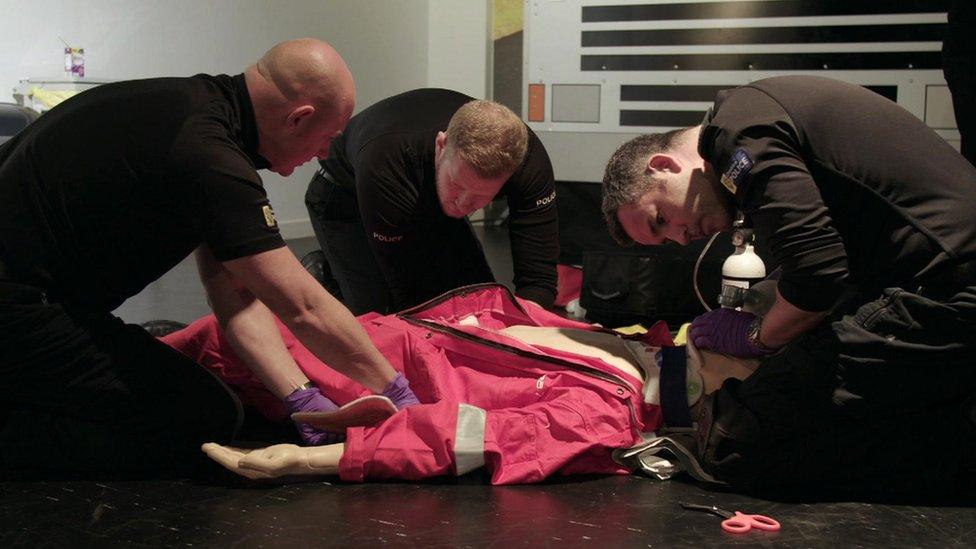
... and also how to save lives
Did they pass? Well, watch our fly-on-the-wall film to find out.
Without giving too much away, what I and my colleagues John Owen, producer, and Martin McQuade, camera, witnessed was an awful lot of hard work.
There were some moments where recruits got a dressing down by their trainers for failing to learn fast enough.
The point was repeatedly made to them that if they were slow in making the right decision, the consequences could be fatal.
And they also needed to learn when to use words, rather than bullets, to stop a situation spiralling out of control.
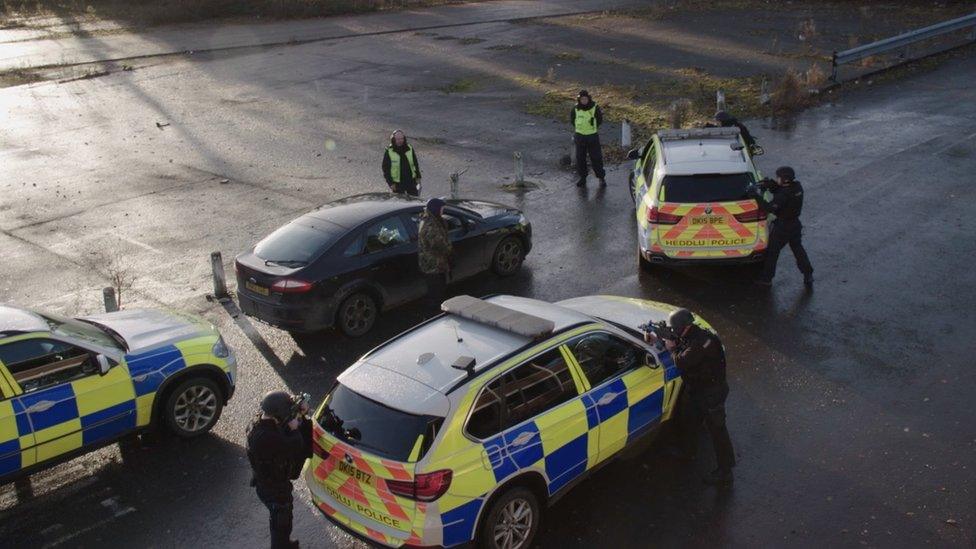
Officers practise how to contain vehicles carrying armed suspects
Sir Bernard Hogan-Howe, the recently retired Metropolitan Police Commissioner, warned that his force was recruiting from a very shallow pool of officers willing to carry a gun.
That, he says, is because many don't want the risks that come with the job - not necessarily the risk of being shot, but of ending up in court or under investigation for years.
Despite the political and media focus being on terrorism, the reality is that most of armed response policing work is unchanged from year to year.
Sometimes they'll be called to an armed robbery - less often than they used to be.
But most of the time they'll be dealing with extreme domestic violence situations, organised gang crime incidents and, sadly, mentally unwell people capable of doing themselves, or others harm.
So were the trainee officers I saw up to the task? Watch the film and decide for yourself.
Watch the Victoria Derbyshire programme on weekdays between 09:00 and 11:00 on BBC Two and the BBC News channel.